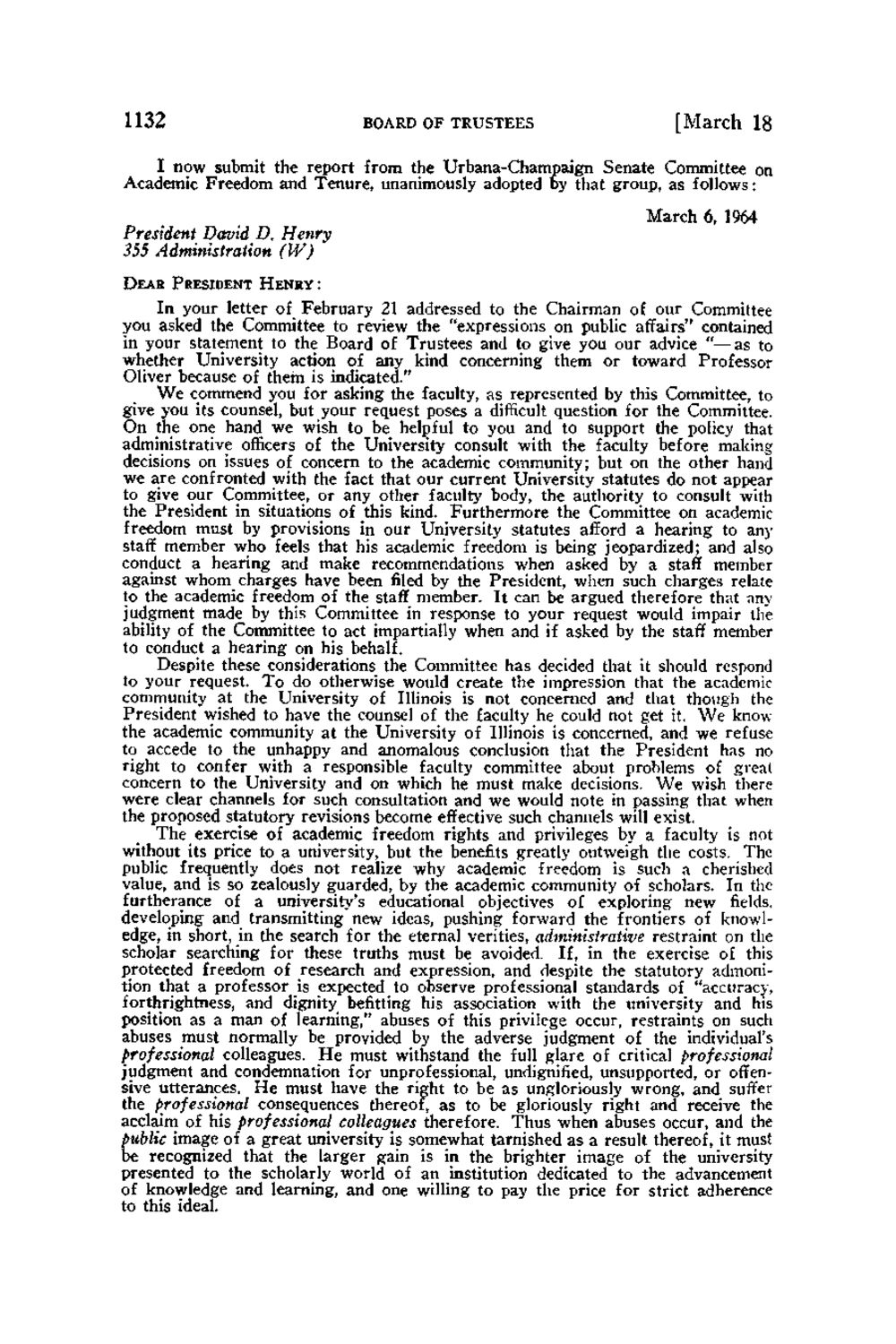| |
| |
Caption: Board of Trustees Minutes - 1964
This is a reduced-resolution page image for fast online browsing.

EXTRACTED TEXT FROM PAGE:
1132 BOARD OF TRUSTEES [March 18 I now submit the report from the Urbana-Champaign Senate Committee on Academic Freedom and Tenure, unanimously adopted by that group, as follows: March 6, 1964 President David D, 355 Administration Henry (W) DEAR PRESIDENT H E N R Y : In your letter of February 21 addressed to the Chairman of our Committee you asked the Committee to review the "expressions on public affairs" contained in your statement to the Board of Trustees and to give you our advice "—as to whether University action of any kind concerning them or toward Professor Oliver because of them is indicated." We commend you for asking the faculty, as represented by this Committee, to give you its counsel, but your request poses a difficult question for the Committee. On the one hand we wish to be helpful to you and to support the policy that administrative officers of the University consult with the faculty before making decisions on issues of concern to the academic community; but on the other hand we are confronted with the fact that our current University statutes do not appear to give our Committee, or any other faculty body, the authority to consult with the President in situations of this kind. Furthermore the Committee on academic freedom must by provisions in our University statutes afford a hearing to any staff member who feels that his academic freedom is being jeopardized; and also conduct a hearing and make recommendations when asked by a staff member against whom charges have been filed by the President, when such charges relate to the academic freedom of the staff member. It can be argued therefore that any judgment made by this Committee in response to your request would impair the ability of the Committee to act impartially when and if asked by the staff member to conduct a hearing on his behalf. Despite these considerations the Committee has decided that it should respond to your request. T o do otherwise would create the impression that the academic community at the University of Illinois is not concerned and that though the President wished to have the counsel of the faculty he could not get it. W e know the academic community at the University of Illinois is concerned, and we refuse to accede to the unhappy and anomalous conclusion that the President has no right to confer with a responsible faculty committee about problems of great concern to the University and on which he must make decisions. W e wish there were clear channels for such consultation and we would note in passing that when the proposed statutory revisions become effective such channels will exist. The exercise of academic freedom rights and privileges by a faculty is not without its price to a university, but the benefits greatly outweigh the costs. The public frequently does not realize why academic freedom is such a cherished value, and is so zealously guarded, by the academic community of scholars. In the furtherance of a university's educational objectives of exploring new fields, developing and transmitting new ideas, pushing forward the frontiers of knowledge, in short, in the search for the eternal verities, administrative restraint on the scholar searching for these truths must be avoided. If, in the exercise of this protected freedom of research and expression, and despite the statutory admonition that a professor is expected to observe professional standards of "accuracy, forthrightness, and dignity befitting his association with the university and his position as a man of learning," abuses of this privilege occur, restraints on such abuses must normally be provided by the adverse judgment of the individual's professional colleagues. H e must withstand the full glare of critical professional judgment and condemnation for unprofessional, undignified, unsupported, or offensive utterances. H e must have the right to be as ungloriously wrong, and suffer the professional consequences thereof, as to be gloriously right and receive the acclaim of his professional colleagues therefore. Thus when abuses occur, and the public image of a great university is somewhat tarnished as a result thereof, it must be recognized that the larger gain is in the brighter image of the university presented to the scholarly world of an institution dedicated to the advancement of knowledge and learning, and one willing to pay the price for strict adherence to this ideal.
| |